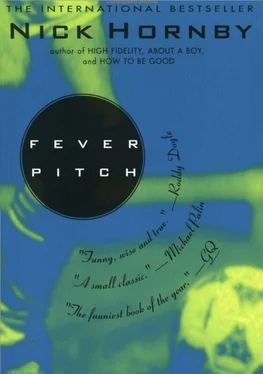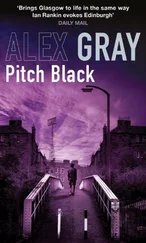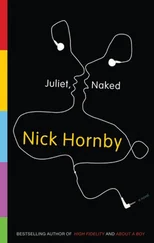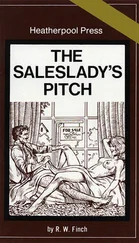Something went wrong—they hadn’t opened enough turnstiles, or the police had made a pig’s ear of controlling the crowd flow, whatever—and there was a huge crush outside the North Bank entrances on the Avenell Road. I could pick both my legs up and remain pinioned and, at one stage, I had to put my arms in the air to give myself just that little bit more room and to stop my fists digging into my chest and stomach. It wasn’t anything that special, really; fans have all been in situations where for a few moments things have looked bad. But I remember struggling for breath when I approached the front of the queue (I was so constricted that I couldn’t fill my lungs properly) which means that it was a little bit worse than usual; when I finally got through the turnstile I sat down on a step for a while, gave myself time to recover, and I noticed that a lot of other people were doing the same.
But the thing was, I trusted the system: I knew that I could not be squashed to death, because that never happened at football matches. The Ibrox thing, well that was different, a freak combination of events; and in any case that was in Scotland during an Old Firm game, and everyone knows that these are especially problematic. No, you see, in England somebody, somewhere, knew what they were doing, and there was this system , which nobody ever explained to us, that prevented accidents of this kind. It might seem as though the authorities, the club and the police were pushing their luck on occasions, but that was because we didn’t understand properly how they were organising things. In the melee in Avenell Road that night some people were laughing, making funny strangled faces as the air was pushed out of them; they were laughing because they were only feet away from unconcerned constables and mounted officers, and they knew that this proximity ensured their safety. How could you die when help was that close?
But I thought about that evening nine years later, on the afternoon of the Hillsborough disaster, and I thought about a lot of other afternoons and evenings too, when it seemed as though there were too many people in the ground, or the crowd had been unevenly distributed. It occurred to me that I could have died that night, and that on a few other occasions I have been much closer to death than I care to think about. There was no plan after all; they really had been riding their luck all that time.
ARSENAL v TOTTENHAM
30.8.80
There must be many fathers around the country who have experienced the cruellest, most crushing rejection of all: their children have ended up supporting the wrong team. When I contemplate parenthood, something I do more and more as my empathetic biological clock ticks nearer to midnight, I am aware that I am genuinely fearful of this kind of treachery. What would I do if my son or daughter decided, at the age of seven or eight, that Dad was a madman, and that Tottenham or West Ham or Manchester United were the team for them? How would I cope? Would I do the decent parental thing, accept that my days at Highbury were over, and buy a couple of season-tickets at White Hart Lane or Upton Park? Hell, no. I am myself too childish about Arsenal to defer to the whims of a child; I would explain to him or her that, although I would respect any decision of this kind, obviously if they wished to see their team then they would have to take themselves, with their own money, under their own steam. That should wake the little sod up.
I have more than once fantasised about Arsenal playing Tottenham in the Cup Final; in this fantasy my son, as rapt and tense and unhappy as I was when I first supported Arsenal, is a Spurs fan, and as we could not get tickets for Wembley we are watching the game at home on TV. In the last minute the old warhorse Kevin Campbell scores the winner … and I explode into a frenzy of joy, leaping around the sitting room, punching the air, jeering at, jostling, tousling the head of my own traumatized child . I fear that I am capable of this, and therefore the mature, self-knowing thing to do would be to see the vasectomist this afternoon. If my father had been a Swindon Town fan in 1969, on that awful afternoon at Wembley, and had reacted appropriately, we would not have spoken for twenty-two years.
I have already successfully negotiated one hurdle of this kind. In August 1980 my father and his family came back to England after more than ten years abroad in France and America. My half-brother Jonathan was thirteen, and crazy about soccer—partly due to my influence, partly because he had been in the States while the now-defunct North American Soccer League was at its zenith. And so, as quickly as possible, before he had a chance to work out that what was happening at White Hart Lane with Hoddle and Ardiles was infinitely more interesting than what was going on at Highbury with Price and Talbot, I took him to Arsenal.
He’d been once before, in 1973 when, as a six-year-old, he’d shivered uncontrollably through, and stared uncomprehendingly at, a third-round Cup match against Leicester, but he’d long forgotten that, so this early-season local derby was a fresh start. It wasn’t a bad game, and certainly no indicator of the desperate times ahead: Pat Jennings, the Tottenham reject, kept out Crooks and Archibald for most of the first half, and then whichever of Spurs’ terrible post-Pat keepers (Daines? Kendall?) let in a soft one before Stapleton finished them off with a wonderful lob.
But it wasn’t the football that captivated Jonathan. It was the violence. All around us, people were fighting—on the North Bank, on the Clock End, in the Lower East Stand, in the Upper West. Every few minutes a huge gash would appear somewhere in the tightly woven fabric of heads on the terraces as the police separated warring factions, and my little brother was beside himself with excitement; he kept turning round to look at me, his face shining with a disbelieving glee. “This is incredible ,” he said, over and over again. I had no trouble with him after that: he came to the next game, a drab, quiet League Cup match against Swansea, and to most of the others that season. And now we have season-tickets together, and he drives me to away games, so it’s all worked out OK.
Is he an Arsenal fan simply because for a long time he expected to see people attempt to kill each other? Or is it just because he looked up to me, as I know he did for a while, inexplicably, when he was younger, and therefore trusted me and my choice of team? Either way, I probably didn’t have the right to inflict Willie Young and John Hawley and the Arsenal offside trap on him for the rest of his days, which is what I have ended up doing. So I feel responsible, but not regretful: if I had not been able to secure his allegiance to the cause, if he had decided to look for his footballing pain elsewhere, then our relationship would have been of an entirely different and possibly much cooler nature.
Here’s a funny thing, though: Jonathan and I sit there, at Highbury, week after week, partly because of the distressing circumstances that led to his existence. My father left my mother in order to set up home with his mother, and my half-brother was born, and somehow all this turned me into an Arsenal fan; how odd, then, that my peculiar kink should have been transferred on to him, like a genetic flaw.
ARSENAL v STOKE CITY
13.9.80
How many games like this did we watch, between Brady’s departure and George Graham’s arrival? The away team are struggling, unambitious also-rans; their manager (Ron Saunders, or Gordon Lee, or Graham Turner, or, in this case, Alan Durban) wants a draw at Highbury, and plays five defenders, four midfielders who used to be defenders, and a hopeless centre-forward standing on his own up front, ready to challenge for punts from the goalkeeper. Without Liam (and, after this season, without Frank Stapleton), Arsenal didn’t have the wit or the imagination to break the opposition down, and maybe we won (with a couple of goals from near-post corners, say, or a deflected long-shot and a penalty), or maybe we drew (nil-nil), or maybe we lost 1-0 to a goal on the break, but it didn’t really matter anyway. Arsenal were nowhere near good enough to win the League, yet were much too competent to go down; week after week, year after year, we turned up knowing full well that what we were about to witness would depress us profoundly.
Читать дальше











